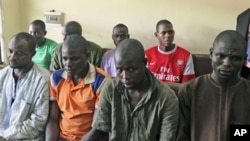A man, who identified himself as a Nigerian politician, an activist and opinion leader from northern Kano state, said the hunt for Boko Haram militants should not strictly be a military or security issue.
Instead, he said the government must involve Christian and Muslim leaders in the process.
He agreed to be interviewed by VOA on condition of anonymity because he fears Boko Haram and government security forces might harm him or his family.
The self-identified politician said northern religious leaders and politicians are not Boko Haram sympathizers.
“First of all, government officials and security agencies’ diagnosis of the reasons why Boko Haram arose was basically wrong. That prevented a lot of elites and elders from dabbling into it because the ones who attempted to do that were all shouted down. They were labeled as sympathizers, sponsors and supporters,” he said.
The man said regular northerners were also isolated by the harsh modus operandi (methods) of the Joint Task Force (JTF’s).
“There was gross violation of human rights; there was no accountability, no oversight from anybody. They could just [go] into your house, pick you up without anybody holding to an account. So, from this brief analysis, you can see that, from the top of the ladder to the lower end of the ladder, everybody was picked up for one reason or another. If the government had involved the people in the community, I can guarantee you it would never have [been] raised to the level that it did,” he said.
He said northern politicians, religious and civil society leaders have been trying on the family level to end the Boko Haram menace.
“You cannot get involved because, even if you come up publicly to engage other members of the society, we don’t know who Boko Haram is. They don’t wear its hat; they don’t wear a T-shirt that proclaims they are Boko Haram. So, all you do is to talk to the younger elements in your family to be aware of these people. They should not join any group; they should watch their movement; just moral persuasion,” he said.
“It is beyond question that I abhor, I detest, and I condemn Boko Haram in its totality, and I’m not the only one. Ninety-nine-point-nine percent of all northerners are not in support of Boko Haram,” he added.
The anonymous caller’s comments came as witnesses from the northern city of Maiduguri Monday accused security forces of killing 30 people.
Residents said the violence took place Monday after a bomb exploded on an army patrol, wounding two soldiers.
Maiduguri is at the center of operations for Boko Haram, which is blamed for killing more than 1,400 people in recent years.
Instead, he said the government must involve Christian and Muslim leaders in the process.
He agreed to be interviewed by VOA on condition of anonymity because he fears Boko Haram and government security forces might harm him or his family.
The self-identified politician said northern religious leaders and politicians are not Boko Haram sympathizers.
“First of all, government officials and security agencies’ diagnosis of the reasons why Boko Haram arose was basically wrong. That prevented a lot of elites and elders from dabbling into it because the ones who attempted to do that were all shouted down. They were labeled as sympathizers, sponsors and supporters,” he said.
The man said regular northerners were also isolated by the harsh modus operandi (methods) of the Joint Task Force (JTF’s).
“There was gross violation of human rights; there was no accountability, no oversight from anybody. They could just [go] into your house, pick you up without anybody holding to an account. So, from this brief analysis, you can see that, from the top of the ladder to the lower end of the ladder, everybody was picked up for one reason or another. If the government had involved the people in the community, I can guarantee you it would never have [been] raised to the level that it did,” he said.
He said northern politicians, religious and civil society leaders have been trying on the family level to end the Boko Haram menace.
“You cannot get involved because, even if you come up publicly to engage other members of the society, we don’t know who Boko Haram is. They don’t wear its hat; they don’t wear a T-shirt that proclaims they are Boko Haram. So, all you do is to talk to the younger elements in your family to be aware of these people. They should not join any group; they should watch their movement; just moral persuasion,” he said.
“It is beyond question that I abhor, I detest, and I condemn Boko Haram in its totality, and I’m not the only one. Ninety-nine-point-nine percent of all northerners are not in support of Boko Haram,” he added.
The anonymous caller’s comments came as witnesses from the northern city of Maiduguri Monday accused security forces of killing 30 people.
Residents said the violence took place Monday after a bomb exploded on an army patrol, wounding two soldiers.
Maiduguri is at the center of operations for Boko Haram, which is blamed for killing more than 1,400 people in recent years.













